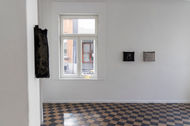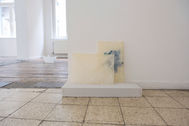transferring, 2025.
Duo exhibition with Andrea Kerstens, ZSenne Artlab, Brussels, BE.
Installation with video and isomalt.
transferring explores fragile acts of passing on—whether through language, memory, or material. With matter and moving image, the exhibition reflects on how meaning travels; clearly, with friction, hesitation, or transformation. Works by artists Amit Leblang and Andrea Kerstens weave translation, intimacy, and memory into shifting forms of transmission.
(...) Diens naam wordt alsnog bekend als iemand op een nacht het mannetje in het bos bij een vuur ziet dansen, terwijl hij al zingend zijn naam verklapt:
“Niemand weet, niemand weet, dat ik Repelsteeltje heet.”
On the way back from a studio coffee with A&A, I am reading ‘The memory police’ by Yoko Ogawa. The main character, who is a writer, lives in a society that suffers from disappearances. When something has vanished, her memory and understanding of it disappear alongside it. As the disappearances progress, language becomes increasingly impotent. People can no longer describe or even comprehend what has been lost. If the word is gone, the thought becomes harder to access.
The notion that language refers to things by their true names has been central to philosophical study as well as various traditions of magic, religious invocation and mysticism since antiquity (according to Wikipedia). If you don’t know the true name of a thing, you don’t know its true nature. This then carried over to recent folklore, where the true name is more often used as a plot device to master an obstacle. In these stories, something’s true name is out there… you need only find it. Sometimes it feels to me that I’m fishing for something’s true name when I’m struggling to voice a thought, like trying to translate a language I don’t fully know. (Some people think in clear words and phrases, I am not often one of them). The role of context in translation in general cannot be overstated, as it serves as the foundation upon which accurate and meaningful translations are built. Empirical experience becomes integral in finding the right words. It is clear that ‘correct’ language fluctuates, and is not easily pinpointed. Is there a ‘truth’ in naming, if every person, every context calls for a different understanding?
In the memory police, the protagonist’s friend ‘R’ does remember things and the names belonging to them. R guards the objects that have disappeared, and he believes they hold the key to the memories lost. He asks the protagonist to keep some with her, to look at them and touch them and analyse them, firmly believing that their nature will reveal itself. I am reminded of someone telling me that some objects simply have a ‘thing power’. Theorist Jane Bennett coined this term; she acknowledges that material and objects are not passive. According to Bennett, it is “not a world of subjects and objects, but of various materialities constantly engaged in a network of relations”. Things are active and are constantly doing something. A thing has agency. It acts upon us. In that way, they hold their true name for everyone to see. Nevertheless, though the protagonist studies her keepsakes dutifully every night, her things never reveal their essence to her.
Earlier, in the studio, Amit searches like a detective for the right word, the right translation - I see her turning the words around and looking at them from a multitude of different meanings and experiences. While standing in the middle of Andrea’s works, I throw out some words that I think describe what I see, and I await her reaction to them. Instead, she looks shy-ly away, back towards the objects.
Nienke Fransen, September 2025

Photos: Amel Omar























